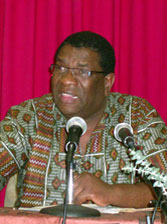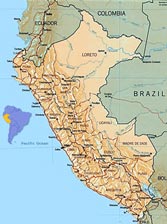FCNNEWSSOURCE
Blacks in Peru long for role models, self knowledge as they demand opportunity, justice

Dr. Jorge Ramirez Reyna, a civil rights and social change activist in Peru, is also the executive director of the Black Association for the Defense and Promotion of Human Rights (ASONEDH).He recently visited the United States to share the experiences and insights of Blacks of African descent in Peru and to learn more about the experiences of Blacks in America. Last summer, a 7.9 earthquake on the Richter Scale hit the Peruvian coastline and killed hundreds of people. Dr. Ramirez Reyna met with Final Call Western Region Correspondent Charlene Muhammad during his five-day trip and gave an update on the plight of Afro Peruvians before and since the earthquake. He also discussed some of their goals and aspirations. Hasani Soto, a member of the organization US and Dr. Ramirez Reyna’s host, provided translation during the interview.
Final Call (FC): How has your community recovered since the earthquake in August of 2007?

Dr. Jorge Ramirez Reyna (JRR): Many people donated money and resources but the people don’t have food, houses, and nobody knows where the donations that poured in for them are. We suppose there is high corruption and there’s no will of support because the majority of the people are Black. It’s very similar to what occurred with Hurricane Katrina. Some governments, Venezuela and Brazil, have created some basic houses for them, but no one else. Still, people are suffering so much that they don’t even seek food and clothes; right now they are seeking a place to live to help cover them from the rain and the cold.
FC: You mentioned that in addition to the physical suffering, your people have been victimized by very negative images of them on all levels and that ASONEDH was working with and training the women about their African culture. The aim is to help erase the negative culture they’ve been taught and teach the children and the community the true culture of your people. How have the women responded to the retraining and what type of progress have you noticed since they have been re-teaching the true history to the children?
JRR: What I have seen is there’s an interest that is increasing, so we can find out more about our African history. We don’t have the tools that would permit us to teach more to these women, because there’s not enough African literature in Peru. So we base it on basic history that we find on the Internet, but there’s no existing educational program for Black women.
FC: If there were people in the Black community here and the Diaspora who wanted to assist, what specific things would you need for them to provide?
JRR: It is very important that we receive information regarding the struggles of Black women so this can serve as a stimulus to the Black women in Peru. It is the education that changes the minds of the people and makes good models.
FC: How are your schools in Peru?

JRR: Very poor where there’s a mixture of Blacks, Indigenous and Mestisos or mixed people. The Peruvian education is one of the worse in Latin America. We only surpass Haiti in education. This is a problem that we would like to reverse. For example, I am a lawyer. There’s about 40,000 registered lawyers, however, I only know about 30 Black lawyers. There are other professions like that. The same system put obstacles for us to become professionals and those who are not prepared for the struggle, we are left without professions. We are chauffeurs, hotel bellhops and the young people work as coffin makers and pallbearers.
FC: In the United States there is a high education dropout rate. What is it like in Peru?
JRR: Young people begin dropping out of school at around 12 years old. There are a lot of obstacles in the system of education. It is a bother for the youth and discouraging for the Black students because it excludes them. The education system insults Black people. For example, when a little Black girl touches the head of a White girl, she’s bothering her. When a White girl touches the head of a Black girl, they’re playing.
FC: Our culture experiences some of the same issues.
JRR: The difference is that in Peru, Black people don’t have high political positions as you do here. The Black theme is not in the public agenda.
FC: Understanding that difference that you mentioned, many people here are elated that Barack Obama won the presidential election but we’re clear that our condition will not change overnight. We suffer mass incarceration, miseducation, and poor healthcare but I hear what you’re saying, it doesn’t compare? You’re saying people from your community would come here and see great opportunity.
JRR: The tragedy is that we are invisible. You are all visible. We don’t have a history. We are not considered citizens. They don’t care about our votes. The political parties do not go to our communities because we are not important. The worst racism in the total of Latin America is the invisibility. The educational texts do not talk about us. At school and the universities, they don’t talk about us.
FC: Your organization has been working to break away from the tragedy. Tell us more about how.
JRR: For many years we have been denouncing the exclusion of our people. We have done some marches and protests against racists clubs because they don’t allow Black people although we’ve noticed that it’s very important to participate in politics because we want to be inside the door. We’ve been knocking, knocking, knocking and we want to become the people who open that door so our people can begin to develop. But we want to establish this with people that are militant and activists, not Blacks that think White and when they have power they forget about their roots. This is why we are organizing in every Afro Peruvian community future leaders. We would like in 2011 that the democratic elections would present 100 Black candidates for the elections, which has never happened historically. We want to prepare young Black people, activists, to participate in politics.
FC: What do you think about Barack Obama and his rise?
JRR: We believe that he is an example, model, that we can do it and be in the same position that he is in. I don’t know what’s going to happen after he takes office Jan. 20, or what agreement he has made with the right, but we know that there’s a Black man who’s president of the greatest country in the world. This is something that inspires us and makes us see that we can get there, too. It’s excellent.
FC: What did you enjoy most about your visit to Los Angeles?
JRR: That I’ve seen a lot of Black people. I feel blacker here than in Peru because there’s a magic here that makes me feel more African.
FC: Any message for Blacks here in America who may read your words here?
JRR: To my North American brothers and sisters, remember that in Peru there are your younger brothers, a population of Afro Peruvians that have not lost their faith in having a better quality of life. Their rights should be respected and they should not face discrimination. For that we need our brothers and sisters from the United States that would serve as models and support that we can know, yes, there’s a possibility that we can fight against inequality and for our rights and respect.
FC: Thank you.












